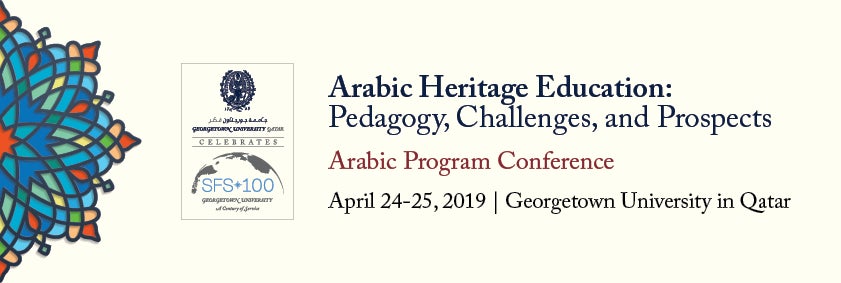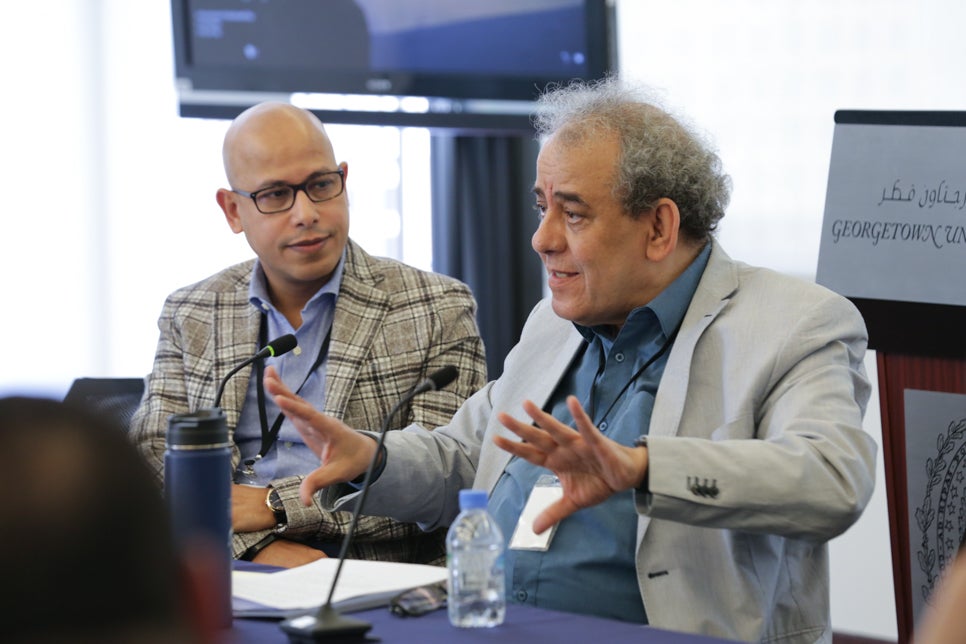Arabic Conference


Conference on Teaching Arabic to Heritage Learners
The Arabic Language Department at GU-Q organized a two-day conference titled “Arabic Heritage Education: Pedagogy, Challenges, and Prospects.” The international gathering of leading scholars in the field of Arabic language instruction shared ideas and research on the unique learning requirements and teaching strategies for Arabic speaking students.
Conference Brief
This conference sought to address significant aspects of heritage Arabic education, providing a platform for sharing and discussing key issues in this field.
Over the past 10 years the Arabic program at Georgetown University in Qatar (GU-Q) has been predominantly involved in defining, articulating, and offering a separate track in Arabic language, culture, and literature introduced as Heritage Arabic. This track targets students of Arab descent, who have a connection to Arabic culture but whose pre-college language of instruction is not Arabic. While speaking one Arabic dialect fluently, these students have limited exposure to Modern Standard Arabic, which usually influences their competency in reading and writing skills. Constituting the majority of our Arabic students at GU-Q, these students often graduate from international high schools in the Arab world, but can also be identified among Arab communities living outside the Arab world. This conference sought to address significant aspects of heritage Arabic education and to provide a platform for sharing and discussing key issues in this field. Given the recent recognition of this separate track in Arabic learning, much needs to be done in terms of research, course preparation, and material development.
Program
April 24, 2019
9:00 – 9:30 Registration
9:30 – 10:30: Keynote Address by Abbas Al Tonsi “Teaching Arabic to non-native speakers, Heritage Speakers and Those Inbetween: Concepts and Ideas” Moderated by Yehia Mohamed
10:30 – 11:00 Break
11:00 – 1:30 Session 1: Teaching the Inheritors of the Arabic Language: Insights, Methods, and Prospects Moderator: Amira El-Zein
- Riḥla ilā Bilād al-‘Arab: A Comprehensive Introductory Course for Heritage Speakers: Munther Younes
- Heritage Learners in the East and West: Common Features and Pedagogy: Ahmad Al Qassas
- Preparing Instructors to Work with Heritage Arabic Learners: Atiya Youssef
1:30 – 2:30 Lunch Break
2:30 – 4:30 Session 2: The Role of Literature and Narration in Teaching Language Inheritors: Moderator: Hanny Fazza
- Teaching children’s literature and its impact on heritage learners: Hosni Mallitat
- Teaching Arabic Literature to Heritage Learners: Problems and Solutions: Yousef Shehada
- Performing lived experience: an Analysis of Arabic Heritage Speakers’ Narratives in Two Languages: Idris Soleimani, Ibrahim Shokrani
April 25, 2019
9:00 – 9:30 Reception
9:30 – 12:00 Session 1: Addressing the Mistakes of Heritage Learners Moderator: Omar Khalifa
- Writing Errors in Arab Heritage Learners: Yehia Mohamed, Kholood Saqbani
- The Mistakes of Arab Heritage Learners and their Causes: Hany Fazza, Zainab Ibrahim
- Written Production of the Arabic Heritage Learners: Error Analysis and Transfer Patterns: Youssef Nouhi
- The mistakes of Arabic Heritage learners in Britain: Muntasir Al Hamad
12:00 – 1:00 Lunch Break
1:00 – 3:00 Session 2: Trends and Experiences of Heritage Learners Moderator: Abdul Rahman Chamseddine
- A proposed vision in designing educational programs for bilingual children of Arabic (problems and solutions), Turkish learners as a model: Mohamad Alkhalaf
- Educational Profile and Motivational Orientations of Arabic Heritage Learners in Italy: Marco Golfetto
- Heritage and non-Native Learners in the Same Class: Between Ideal and Specificity Recognition: Letitzia Lumbizzi
- Teaching Arabic to Arabic Heritage Learners,The Georgetown Experience in Qatar: Mahmoud Al-Ashiri
3:30 – 4:00 Break
4:00 – 5:00 Closing Discussion Moderator: Abbas Al-Tonsi